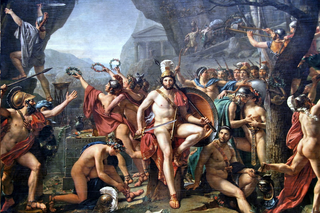Related Research Articles

The Second Peloponnesian War, often called simply the Peloponnesian War, was an ancient Greek war fought between Athens and Sparta and their respective allies for the hegemony of the Greek world. The war remained undecided until the later intervention of the Persian Empire in support of Sparta. Led by Lysander, the Spartan fleet finally defeated Athens which began a period of Spartan hegemony over Greece.

This article concerns the period 409 BC – 400 BC.
This decade witnessed the continuing decline of the Achaemenid Empire, fierce warfare amongst the Greek city-states during the Peloponnesian War, the ongoing Warring States period in Zhou dynasty China, and the closing years of the Olmec civilization in modern-day Mexico.

Alcibiades was an Athenian statesman and general. The last of the Alcmaeonidae, he played a major role in the second half of the Peloponnesian War as a strategic advisor, military commander, and politician, but subsequently fell from prominence.
Year 412 BC was a year of the pre-Julian Roman calendar. At the time, it was known as the Year of the Consulship of Ambustus and Pacilus. The denomination 412 BC for this year has been used since the early medieval period, when the Anno Domini calendar era became the prevalent method in Europe for naming years.
Year 419 BC was a year of the pre-Julian Roman calendar. At the time, it was known as the Year of the Tribunate of Lanatus, Rutilus, Tricipitinus and Axilla. The denomination 419 BC for this year has been used since the early medieval period, when the Anno Domini calendar era became the prevalent method in Europe for naming years.
Year 418 BC was a year of the pre-Julian Roman calendar. At the time, it was known as the Year of the Tribunate of Fidenas, Axilla and Mugillanus. The denomination 418 BC for this year has been used since the early medieval period, when the Anno Domini calendar era became the prevalent method in Europe for naming years.
Year 417 BC was a year of the pre-Julian Roman calendar. At the time, it was known as the Year of the Tribunate of Tricipitinus, Lanatus, Crassus and Axilla. The denomination 417 BC for this year has been used since the early medieval period, when the Anno Domini calendar era became the prevalent method in Europe for naming years.
Spartan hegemony refers to the period of dominance by Sparta in Greek affairs from 404 to 371 BC. Even before this period the polis of Sparta was the greatest military land power of classical Greek antiquity and governed, dominated or influenced the entire Peloponnese. The defeat of the Athenians and the Delian League in the Peloponnesian War in 431–404 BC resulted in a short-lived Spartan dominance of the southern Greek world from 404 to 371 BC. Due to their mistrust of others, Spartans discouraged the creation of records about their internal affairs. The only histories of Sparta are from the writings of Xenophon, Thucydides, Herodotus and Plutarch, none of whom were Spartans. Plutarch was writing several centuries after the period of Spartan hegemony had ceased. This creates difficulties in understanding the Spartan political system, which was distinctly different from any other Greek polis.
The ephors were a board of five magistrates in ancient Sparta. They had an extensive range of judicial, religious, legislative, and military powers, and could shape Sparta's home and foreign affairs.
Agis II was the 18th Eurypontid king of Sparta, the eldest son of Archidamus II by his first wife, and half-brother of Agesilaus II. He ruled with his Agiad co-monarch Pausanias.
Leotychidas II was king of Sparta between 491–476 BC, alongside Cleomenes I and later Leonidas I and Pleistarchus. He led Spartan forces during the Persian Wars from 490 BC to 478 BC.

Leonidas II was the 28th Agiad King of Sparta from 254 to 242 BC and from 241 to 235 BC.
Archidamia was a Spartan queen, wife of Eudamidas I, mother of Archidamus IV and Agesistrata, grandmother of Eudamidas II, and great-grandmother of Agis IV.

Classical Greece was a period of around 200 years in Ancient Greece, marked by much of the eastern Aegean and northern regions of Greek culture gaining increased autonomy from the Persian Empire; the peak flourishing of democratic Athens; the First and Second Peloponnesian Wars; the Spartan and then Theban hegemonies; and the expansion of Macedonia under Philip II. Much of the early defining mathematics, science, artistic thought, theatre, literature, philosophy, and politics of Western civilization derives from this period of Greek history, which had a powerful influence on the later Roman Empire. Part of the broader era of classical antiquity, the classical Greek era ended after Philip II's unification of most of the Greek world against the common enemy of the Persian Empire, which was conquered within 13 years during the wars of Alexander the Great, Philip's son.

The Agiad dynasty was one of the two royal families of the Ancient Greek city-state of Sparta. They ruled jointly along with the Eurypontid dynasty, possibly from the 8th century BC onwards, being the senior of the two houses. The hypothetical founder of the dynasty was Agis I, possibly the first king of Sparta at the end of the 10th century BC, who subsequently gave his name to the dynasty. The two lines, who maintained an enduring rivalry, were, according to tradition, respectively descended from the twins Eurysthenes and Procles, both descendants of Heracles. The most famous member of the Agiad dynasty was Leonidas I, known for his heroic death at the Battle of Thermopylae in 480 BC. The last Agiad king was Agesipolis III, deposed by the Eurypontid Lycurgus in 215 BC.

The history of Sparta describes the history of the ancient Doric Greek city-state known as Sparta from its beginning in the legendary period to its incorporation into the Achaean League under the late Roman Republic, as Allied State, in 146 BC, a period of roughly 1000 years. Since the Dorians were not the first to settle the valley of the Eurotas River in the Peloponnesus of Greece, the preceding Mycenaean and Stone Age periods are described as well. Sparta went on to become a district of modern Greece. Brief mention is made of events in the post-classical periods.

The Triumph of Love is a three-act French comic play by Pierre de Marivaux. It was first performed by the Théâtre Italien in Paris on 12 March 1732.
The second Battle of Hysiae between the armies of Argos and Sparta took place in 417 BC during the Peloponnesian War, directly following Sparta's decisive defeat of the Argive/Athenian alliance in the Battle of Mantinea the year before.
Agesistrata, was a Spartan queen, married to king Eudamidas II of Sparta.
References
- ↑ Plutarco, Vite Parallele: Alcibiade, Agesilao, Lisandro.